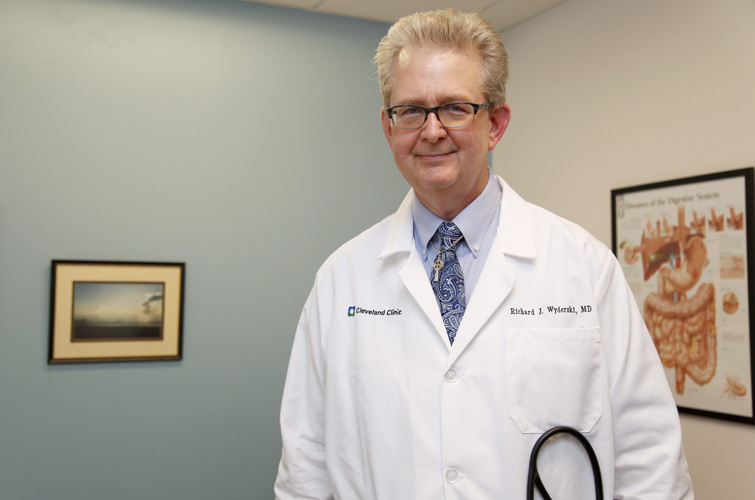
Say the word “dementia” and most people think it means “Alzheimer’s Disease.”
Most people are wrong.
No one knows that better than Cleveland Clinic Indian River Hospital geriatrician Dr. Richard Wyderski.
He knows, just like Johns Hopkins Medicine does, “there are many diseases that cause dementia including: Alzheimer’s disease; Corticobasal Degeneration; Creutzfeldt-Jakob disease; Dementia with Lewy Bodies, Frontotemporal Dementia; HIV Dementia; Huntington’s disease; Normal Pressure Hydrocephalus and Vascular Dementia [as well as] other conditions that can cause dementia or dementia-like symptoms including reactions to medications, metabolic problems and endocrine abnormalities, nutritional deficiencies, infections, brain tumors, anoxia or hypoxia, and heart and lung problems.”
According to Wyderski, “many years ago all of the neurodegenerative disorders were lumped under the term ‘senile dementia’ without any other differentiation. We now try to be as precise as we can with determining what type of dementia person may have, especially since some can be treated and even reversed.”
The most likely reason why so many people today instantly associate ‘dementia’ with Alzheimer’s Disease (AD) can be tied to the laudable work of organizations such as the Alzheimer’s Association, the American Brain Association, the Alzheimer’s Foundation of America, the Alzheimer’s Research & Prevention Foundation and many others to raise awareness while also seeking cures for the long list of diseases and conditions that Wyderski says cause “a loss of cognitive functioning – the ability to think, remember, problem-solve or reason – to such an extent that it interferes with a person’s daily life and activities.”
The National Institute of Neurological Disorders and Stroke agrees with Wyderski wholeheartedly.
And, for the record, of all the nearly 400 various forms of dementia known today, Alzheimer’s is by far the most prevalent.
“Alzheimer’s Disease accounts for 60-80 percent of all dementia or at least contributes to it,” Wyderski says, and the Bright Focus Foundation reports that “more than 5.8 million Americans now have Alzheimer’s disease” and projects that number to reach nearly 14 million by 2050.
If you’re ‘following the money,’ that same foundation says the annual cost of healthcare, long-term care and hospice for people with Alzheimer’s Disease will likely exceed $1.1 trillion by 2050.
So, what’s being done to combat the many forms of dementia?
For starters, says Wyderski, “we now try to be as precise as we can with determining what type of dementia a person may have, especially since some can be treated and even reversed.
“We have different clinical tests for the presence of dementia to see how well the brain is functioning, such as the Montreal Cognitive Assessment test, Kohlman Evaluation of Livings Skills test and others that can help the physician determine if a significant problem with cognition is present.”
That testing can be complicated and extensive.
Wyderski explains: “We need to look at the list of medications that the person is taking to make sure that side effects of the medication isn’t the problem.”
Then comes looking for evidence of severe kidney or liver disease, thyroid abnormalities and B12 levels. And the list just gets longer and may include spinal fluid analysis, genetic testing, MRI brain scans and much, much more.
And while many medical articles on dementia claim it “is not a normal part of aging,” that’s a tough argument to make when, frankly, we don’t know the root causes, according to Wyderski.
For example, he points out, “it was presumed that the deposition of a protein in the brain called beta-amyloid was the culprit for AD, but all of the treatments to prevent or eliminate this protein haven’t led to any improvement in outcomes.”
That said, with upgraded testing and ongoing research that picture may improve. In fact, according to Wyderski, it already has.
“The average amount of time that a person lives with Alzheimer’s Disease from the time of diagnosis until the time of death,” he says, “is 4-8 years, but I’ve cared for people that have had the disease for 10 years or more.”
If you or a loved one shows some of the telltale signs of any form of dementia, consult your physician. He or she may refer you to someone like Wyderski for further examination.
Remember: Many types of dementia can, in fact, be reversed with the proper treatment.
Dr. Richard Wyderski is with the Cleveland Clinic Indian River Hospital. His office is at 3450 11th Court, Suite 201 in Vero Beach. The phone number is 772-794-3364.



